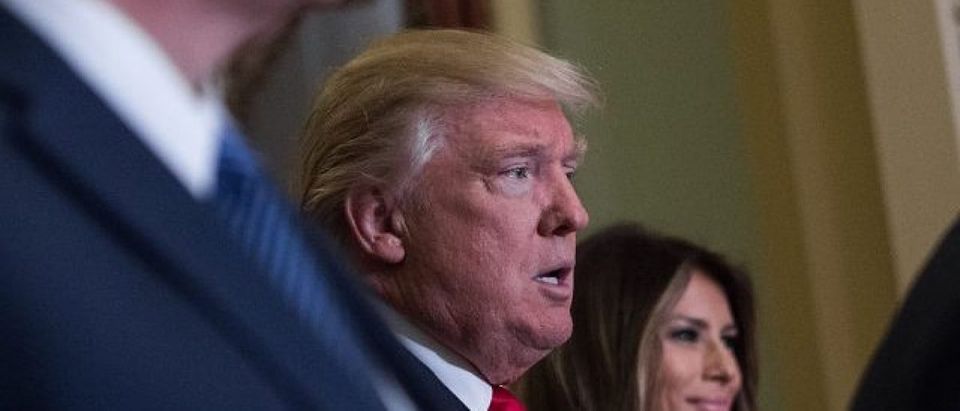Donald Trump’s trademark allergy to apologies will hamstring America if he can’t learn to at least feign regret when the job requires it. Sometimes, American presidents must apologize on behalf of the nation (to defuse international tensions), the administration (to recover from unpopular policies), and himself (to regain the public’s trust).
It’s part of the job description. Every president does it.
Apologies, for example, rebuild relationships with alienated leaders of allied nations, such as when President Obama apologized to Angela Merkel for the National Security Agency’s bugging of her phone and President Reagan’s told Margaret Thatcher he regretted excluding her in planning the US invasion of Granada.
Almost like clockwork, foreign policy emergencies arise which only “I’m sorry” can cure. The fury of Muslim nations at soldiers destroying Korans in 2008 and 2012 was swiftly mollified when Presidents Bush and Obama apologized. When American sailors accidentally filed missiles at a Turkish destroyer, the first president Bush apologized, and when a U.S. submarine sank a Japanese fishing boat, the second president Bush did the same. To reassure Chinese leaders that NATO’s bombing of their embassy in Belgrade was a mistake, Clinton apologized five times – five times!
Every president faces at least one major scandal or humiliation, and apologies have always been an essential element of recovery – whether it’s President Jimmy Carter’s botched mission to rescue the hostages in Iran, Reagan’s role in the Iran-Contra Scandal, George H.W. Bush’s broken pledge not to raise taxes, Clinton’s lies about his affair with Monica Lewinsky, George W. Bush’s inadequate response to Hurricane Katrina, or Obama’s lie that “If you like your health care plan, you can keep it.”
And sometimes American presidents repent for America’s sins by offering regrets to people our nation has hurt. Examples include Reagan’s apologies for World War Two-era Japanese internment camps and Clinton’s for the Tuskegee experiments and American inaction in Rwanda.
Those apologies didn’t enfeeble Reagan or Clinton; they looked strong and compassionate. Here’s Reagan to Japanese-Americans: “No payment can make up for those lost years. So, what is important in this bill has less to do with property than with honor, for here we admit a wrong; here we reaffirm our commitment as a nation to equal justice under the law.”
Imagine if Trump were president when Congress passed its Japanese-American reparations bill. I believe he’d refuse to apologize to the families we interned in failing to heed our nation’s founding values. Because Trump sees an apology as a sign of weakness, something that makes a person – his favorite epithet – a “loser.”
In the course of a controversy-laden campaign, Trump apologized only three times. The first was regarding nothing specific.
“Sometimes, in the heat of debate and speaking on a multitude of issues, you don’t choose the right words or you say the wrong thing. I have done that. And believe it or not, I regret it. And I do regret it, particularly where it may have caused personal pain.”
The second and third times came after his taped remarks about mistreating women became public. His first terse apology was “if anyone was offended,” and his second offered 44 words of regret: “I’ve said and done things I regret, and the words released today on this more than a decade-old video are one of them. Anyone who knows me knows these words don’t reflect who I am. I said it, I was wrong, and I apologize.” Both statements were accompanied by a reminder that the Clintons, in Trump’s opinion, have behaved worse.
And there you have it – every word of apology offered in more than 16 months of a campaign in which the a candidate promiscuously insulted dozens of otherwise sympathetic people and groups, such as POWs, a Mexican judge, a disabled reporter, a female journalist, the family of an American hero, and the Pope.
A largely overlooked hiccup in the third debate crystallizes Trump’s stance on apologies. Trump said:
Justice (Ruth Bader) Ginsburg made some very, very inappropriate statements toward me and toward a tremendous number of people, many, many millions of people that I represent. And she was forced to apologize. And apologize she did. But these were statements that should never, ever have been made.
According to civilized society’s consensus script for apologies, that’s the moment when Trump was supposed to say “And I accept her apology.”
Why didn’t he?
Because Trump sees an apology as a sign of weakness, and he prefers his antagonists weak. He passed on a healing opportunity, though given a Supreme Court justice’s power, a normal politician would rush to soothe tensions. But Trump’s Manichaean Weltanschauung has been rewarded by his followers and enabled by sheep-like national Republicans acting against their better judgment. It’s going to get worse, not better.
Sorry.
David Benkof is Senior Political Analyst for the Daily Caller. Follow him on Twitter (@DavidBenkof) or E-mail him at DavidBenkof@gmail.com.


